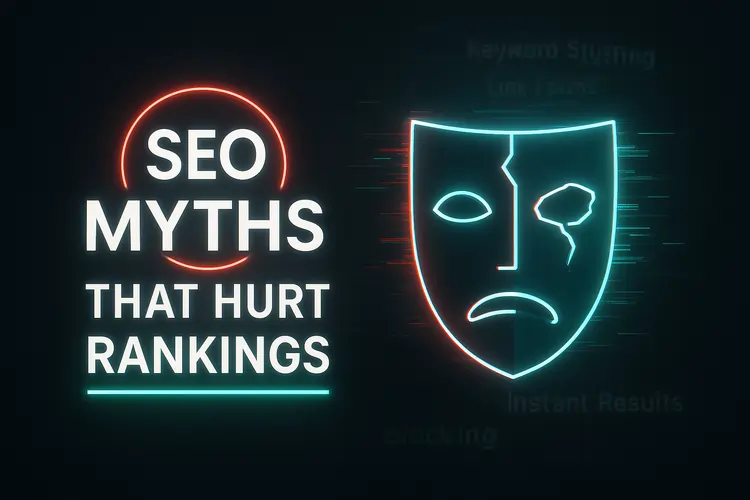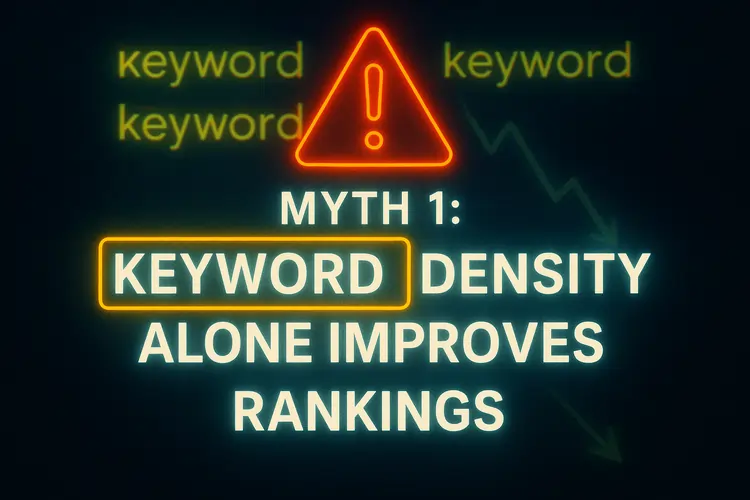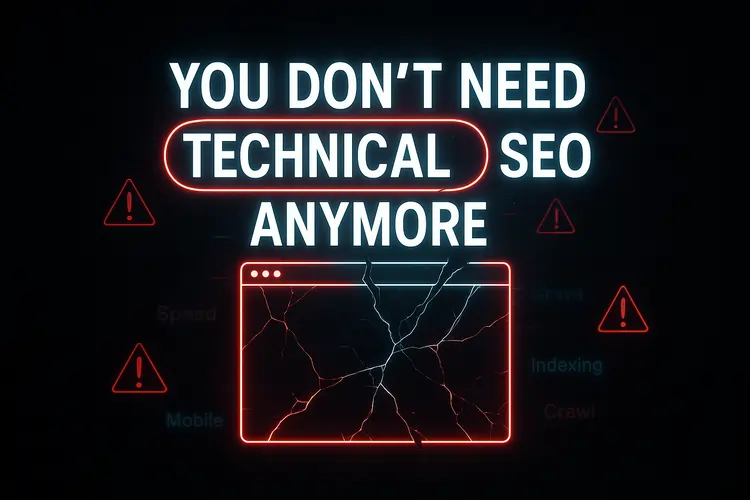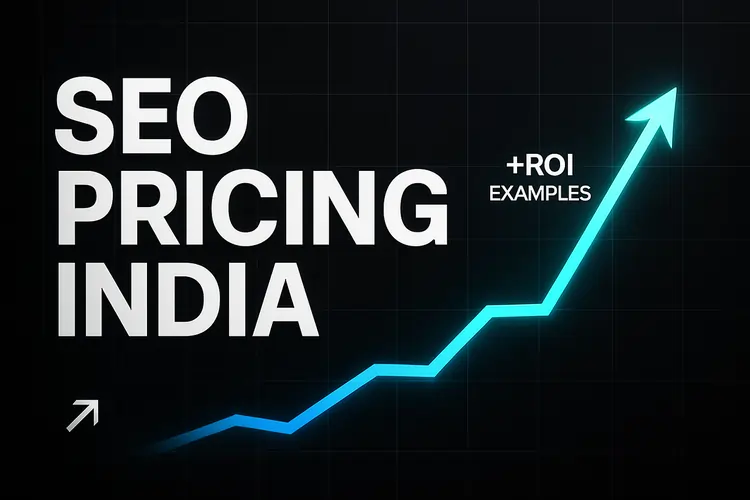SEO myths that hurt rankings are more dangerous than Google updates because they make you follow the wrong playbook.
In 2025, many website owners still waste months chasing outdated strategies while competitors dominate with proven SEO methods.
I’m Deepak Singh, Founder of The DM School (Google Partner Digital Marketing Agency, 1 Lakh+ students trained, featured in Daily Hunt and IANS among 200+ publications).
After auditing thousands of websites, I’ve seen exactly how common SEO myths block growth and keep pages stuck on page 3 of Google.
This guide exposes the top SEO myths that hurt rankings in 2025 — and shows you the right way to replace them with data-backed strategies that actually move the needle.

Table of Contents
- What Are SEO Myths and Why They Hurt Rankings
- Myth 1: Keyword Density Alone Improves Rankings
- Myth 2: Backlinks Matter More Than Content Quality
- Myth 3: SEO is Dead in 2025
- Myth 4: Only Long-Form Content Ranks on Google
- Myth 5: You Don’t Need Technical SEO Anymore
- Myth 6: Paid Ads Boost Organic SEO Rankings
- Myth 7: SEO Results Happen Overnight
- How to Replace Myths With Proven SEO Practices
- FAQ: SEO Myths That Hurt Rankings
- Conclusion: Debunk SEO Myths and Win Rankings
What Are SEO Myths and Why They Hurt Rankings
SEO myths that hurt rankings are false beliefs or outdated tactics that people still follow, even though Google’s algorithms have evolved.
Instead of boosting visibility, these myths waste time, mislead strategies, and keep websites stuck below their potential.
Here’s why common SEO myths are dangerous:
- They delay results: Believing myths like “SEO results happen overnight” makes businesses quit too early.
- They waste resources: Chasing high keyword density or spammy backlinks drains effort without ranking gains.
- They ignore intent: Myths push people to focus on tricks instead of serving user needs.
- They block growth: Outdated SEO advice can keep sites from benefiting from proven methods like SEO audits and SEO for beginners guides.
- They spread fast: Myths are repeated in forums, courses, and blogs, making them seem legitimate.
The truth? SEO success in 2025 comes from aligning with Google’s ranking signals — not shortcuts or outdated hacks.
That’s why debunking SEO myths that hurt rankings is the first step to creating a winning SEO strategy.
Summary: SEO myths hurt rankings by wasting time, ignoring intent, and blocking growth. Real SEO success comes from proven strategies, not outdated hacks.
Myth 1: Keyword Density Alone Improves Rankings
One of the most common SEO myths that hurt rankings is the belief that repeating a keyword enough times will guarantee top positions.
This approach worked in the early 2000s, but Google’s algorithms have evolved far beyond simple keyword counting.

Here’s why keyword density alone does not drive rankings:
- Google understands context: Modern algorithms analyze synonyms, entities, and semantic relationships — not just repetition.
- Over-optimization hurts: Keyword stuffing makes content look unnatural and can trigger ranking penalties.
- Quality signals matter more: Content depth, authority, and UX outweigh density percentages.
- Search intent rules: Google ranks content that solves the query, not content stuffed with words.
🔥 Pro Tip: Aim for natural keyword placement every 150–200 words, but focus more on satisfying intent. Tools from our SEO tools in India list help track balance without overstuffing.
The real key is blending keywords with natural language, supporting context, and comprehensive coverage of the topic.
Summary: Keyword density alone is a myth. Rankings improve when you balance natural keyword use with intent, depth, and authority.
Myth 2: Backlinks Matter More Than Content Quality
Another widespread SEO myth that hurts rankings is believing backlinks alone can outrank high-quality content.
While backlinks remain a core ranking factor, Google increasingly prioritizes content quality, intent match, and user experience over raw link numbers.
Here’s the real comparison between backlinks and content quality:
| Factor | Backlinks | Content Quality |
|---|---|---|
| Impact | Boosts authority & trust | Directly satisfies search intent |
| Control | Depends on external sites | Completely in your control |
| Longevity | Links can decay or be removed | Evergreen content keeps ranking |
| Best Use | Strengthens already good content | Foundation for rankings |
The most effective strategy is combining both: create authority-driven content and then attract natural backlinks through promotion and outreach.
Our SEO Company India services prove this — content hubs rank because of depth first, then links amplify visibility.
Summary: Backlinks matter, but without strong content quality, they won’t sustain rankings. Google rewards content first, links second.
Myth 3: SEO is Dead in 2025
One of the most damaging SEO myths that hurt rankings is the idea that SEO is dead in 2025.
This myth spreads every year, but the reality is that SEO has evolved — not disappeared.
Search is still the backbone of online discovery, with billions of daily queries. Google continues to rely on websites to provide relevant answers, which means SEO is more important than ever.
Here’s why SEO is not dead in 2025:
- Organic traffic persists: Billions of searches still drive visitors to websites daily.
- Content remains king: Google rewards depth, relevance, and authority in content.
- Technical SEO matters: Speed, mobile optimization, and structured data impact rankings.
- AI needs sources: Google’s AI-driven results still depend on quality pages to cite.
- Local SEO thrives: Service pages and local listings keep converting high-intent traffic.
The truth is that SEO isn’t dead — shortcuts are. Outdated tricks no longer work, but systems built on intent, authority, and strong SEO audits continue to deliver results.
New website owners should start with fundamentals like our SEO for beginners guide and strengthen their site’s foundation with Technical SEO best practices.
✅ Pro Tip: Treat SEO as a long-term asset. Consistency in publishing, optimizing, and interlinking beats chasing quick hacks.
Summary: SEO is not dead in 2025. It has evolved into a system-driven approach where content quality, technical health, and authority signals lead to sustainable rankings.
Myth 4: Only Long-Form Content Ranks on Google
A popular SEO myth that hurts rankings is the belief that only 3000+ word articles can reach the first page of Google.
While long-form content has advantages, Google rewards relevance and intent satisfaction more than word count.
❌ Myth
“Google only ranks long-form posts. Short content can’t compete.”
✅ Reality
Google ranks the content that best solves intent — whether 300 words or 3000 words.
Here’s what matters more than length in 2025:
- Search intent: Answer the query directly, whether it needs a short answer or deep guide.
- Content format: FAQs, checklists, and tutorials often outperform long essays.
- Topical authority: Interlink short and long pages through hubs like our SEO Company India page.
- User signals: Engagement, dwell time, and CTR matter more than length alone.
- Content freshness: Updated shorter posts can outrank stale long ones.
Our own SEO for beginners guide proves this — it ranks with balanced content length because it matches intent, not just word count.
Summary: Word count is not a ranking factor. Google rewards intent, relevance, and authority. Both short and long-form content can rank when optimized properly.
Myth 5: You Don’t Need Technical SEO Anymore
One of the most dangerous SEO myths that hurt rankings is thinking technical SEO no longer matters.
Some people believe content alone is enough, but without strong technical foundations, Google may not even crawl or index your site properly.

✅ Technical SEO Checklist in 2025
- Fast load speed: Core Web Vitals affect rankings and conversions.
- Mobile-first design: Over 70% of traffic comes from mobile devices.
- Proper crawlability: Robots.txt, sitemaps, and canonical tags guide Googlebot.
- Structured data: Schema helps win rich snippets on SERPs.
- HTTPS security: Google prefers secure sites, boosting trust and rankings.
- Index coverage: Regularly audit Search Console for crawl errors and fixes.
Neglecting these basics can block your site from competing, no matter how good your content is.
For step-by-step implementation, check our Technical SEO guide and run an SEO audit checklist regularly.
Summary: Technical SEO still matters. Site speed, mobile optimization, crawlability, and structured data are must-haves for sustainable rankings in 2025.
Myth 6: Paid Ads Boost Organic SEO Rankings
Another SEO myth that hurts rankings is the idea that running Google Ads automatically improves organic rankings.
This misconception leads businesses to overspend on ads while neglecting SEO fundamentals like content and technical health.
❌ Myth
“Spending on Google Ads boosts your organic rankings.”
✅ Reality
Google Ads and organic SEO run on separate algorithms. Paid ads bring visibility, but SEO rankings depend on content, links, and site quality.
Here’s the truth about ads vs SEO:
- Different systems: Ads run on bidding and quality score; SEO relies on ranking signals.
- Temporary vs permanent: Ads stop when budget ends, SEO builds long-term visibility.
- Best when combined: Paid ads can test keywords that later feed into SEO strategies.
- Google’s own statement: Ads don’t influence organic rankings in any direct way.
Want proof? Our Google Partner Digital Marketing Agency case studies show that ads drive short-term wins, but SEO keeps the compounding growth alive.
Summary: Paid ads don’t boost organic SEO rankings. They’re separate systems, and the smartest strategy is combining both for reach and long-term ROI.
Myth 7: SEO Results Happen Overnight
This is a classic SEO myth that hurts rankings because it sets false expectations and leads to premature strategy changes.
SEO is compounding, not instant. Timelines depend on competition, content quality, and technical health.
Here is a realistic, lightweight timeline you can model:
- Week 0–1 (Foundation): Run an index, crawl, and speed check. Fix blocking issues, submit XML sitemap, set canonicals. Use our SEO audit checklist and Technical SEO guide.
- Week 1–2 (On-Page Setup): Build a keyword map, optimize 2–3 core pages, add internal links, FAQs, and schema. For basics, see SEO for beginners.
- Week 2–4 (Topical Depth): Publish your first cluster (4–6 posts), target People Also Ask questions, improve EEAT with author bios and references.
- Week 4–8 (Early Signals): First impressions in Search Console, queries appear, some long-tails start ranking. Begin outreach/digital PR and tighten Core Web Vitals.
- Month 3–6 (Compounding): Stable top-20s become top-10s, update winners, prune underperformers. Add local pages via Local SEO services and test video with our YouTube SEO checklist.
Can results come faster? Yes, with low-competition keywords, strong site history, or a powerful internal link architecture.
But expecting overnight rankings leads to churn, content burnout, and budget waste.
If you want a done-for-you roadmap, explore our SEO Company India services or book a free strategy call.
Summary: SEO doesn’t happen overnight. Build foundations, publish topical depth, earn authority, and iterate — that’s how rankings compound.
How to Replace SEO Myths With Proven Practices
Now that you know the biggest SEO myths that hurt rankings, the next step is building habits that actually work in 2025.
Here’s a simple framework to replace myths with proven SEO practices:
- From Keyword Stuffing → To Intent Mapping: Focus on natural placement every 150–200 words and align with user needs. Start with SEO for beginners.
- From Backlinks Obsession → To Authority Content: Create content clusters supported by internal links to hubs like SEO Company India.
- From “SEO is Dead” → To Evolving Systems: Keep auditing with our SEO audit checklist and update pages monthly.
- From Long-Form Only → To Format Diversity: Publish FAQs, checklists, and short explainers alongside guides.
- From Ignoring Technical SEO → To Foundation First: Run technical fixes weekly using our Technical SEO guide.
- From Paid Ads = Rankings → To Hybrid Strategy: Use ads for keyword testing, SEO for compounding visibility.
- From Overnight Expectations → To Realistic Timelines: Plan for 3–6 months of consistent growth and use local plays like Local SEO services.
The key to winning in 2025 is not chasing hacks but following structured SEO systems — technical foundation, intent-driven content, internal linking, and consistent updates.
Summary: Replace SEO myths with proven practices like intent mapping, technical health, and authority-building to achieve lasting Google rankings.
FAQ: SEO Myths That Hurt Rankings
Q1. What are the most common SEO myths that hurt rankings?
The biggest myths include keyword stuffing, backlink obsession, ignoring technical SEO, and expecting overnight results. These SEO myths that hurt rankings waste time and block sustainable growth.
Q2. Does keyword density alone improve SEO rankings?
No. Keyword density alone is an SEO myth that hurts rankings. Google focuses on intent, quality, and authority, not repetition counts.
Q3. Are backlinks more important than content quality?
No. Another SEO myth that hurts rankings is thinking backlinks beat content. Google rewards relevance and authority-driven content first.
Q4. Is SEO dead in 2025?
No. SEO is alive but evolved. Believing “SEO is dead” is one of the SEO myths that hurt rankings. Intent, technical fixes, and authority still drive results.
Q5. Do paid ads improve organic rankings?
No. Paid ads and organic SEO are separate. Believing ads boost SEO is a common SEO myth that hurts rankings.
Q6. Does only long-form content rank on Google?
No. Google rewards intent match, not word count. Believing only long-form ranks is another SEO myth that hurts rankings.
Q7. How long does SEO take to show results?
SEO takes 3–6 months for visible gains. Expecting instant results is one of the SEO myths that hurt rankings.
Conclusion: Debunk SEO Myths and Win Rankings
By now, you’ve seen that SEO myths that hurt rankings are often more dangerous than algorithm updates. They waste effort, create confusion, and keep your site buried on page two or three.
The winners in 2025 are those who replace myths with proven SEO practices — intent-focused content, technical excellence, topical authority, and consistent updates.
At The DM School, we’ve trained 1 Lakh+ students, run ₹100 Cr+ campaigns, and been featured in Daily Hunt, IANS, and 200+ media outlets. Our frameworks help Indian businesses avoid SEO myths that hurt rankings and build systems that scale traffic and revenue.
If you’re ready to replace myths with systems, explore our SEO Company India services or book a free strategy call today.
Summary: Debunk SEO myths, follow proven systems, and partner with experts to turn rankings into lasting business growth.


